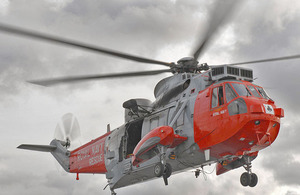Navy SAR crew awarded for daring rescue
A four-man Search and Rescue (SAR) crew from 771 Naval Air Squadron at Royal Naval Air Station Culdrose have been given a special honour for a dramatic and daring rescue of fishermen in rough seas.

A 771 Naval Air Squadron Sea King helicopter (stock image) [Picture: LA(Phot) Gregg Macready, Crown Copyright/MOD 2008]
The crew of ‘Rescue 193’ were recently awarded the Edward and Maisie Lewis Award from the Shipwrecked Fishermen and Mariners’ Royal Benevolent Society which is presented to crews for outstanding rescues.
The event happened on New Year’s Eve in 2009. Rescue 193 had been on shift for seven hours when the call came to scramble and get airborne to assist a middle-aged female casualty with a suspected cardiac arrest at Porthtowan, Cornwall.
However, it was on the way to this more routine call-out that the course of events changed as Falmouth Coastguard received a Mayday call from the fishing vessel Trevessa.
The trawler was floundering in rough seas 50 nautical miles (93km) south west of the Isles of Scilly after a fire had spread through the vessel, disabling the steering, and, as a result, the four-man crew of the trawler had decided to abandon ship. Rescue 193 was retasked to fly to this second incident and faced a race against time to reach the stricken crew.
The rescue team arrived within the hour but were faced with a situation much more desperate than they had envisaged.
The trawler crew had inflated their life raft but it was still attached to the vessel, semi-submerged and unusable, leaving them stranded aboard a burning ship, forced to the last three to four feet (0.9-1m) of the stern as the fire spread.
The crew had to be lifted from the vessel, but Trevessa was a beam trawler with all her derricks swinging fore and aft, and this and the fact it was dark, raining heavily, the sea state was five to six and the wind was gusting at 35-40 knots (65-74km/h) made any rescue attempt extremely hazardous.
There was nowhere suitable for transfer other than the stern as masts, wires and loose fishing gear made all other options far too hazardous. There were no upper deck lights and, once overhead, Rescue 193 lost all radio communication with the captain of the fishing vessel.
Despite the significant risk to their own safety the crew of Rescue 193 decided to go ahead with a hi-line transfer.
Petty Officer Aircrewman Dian ‘Cags’ Lacy was the winchman that night on what would be his last Search and Rescue mission. Showing extreme courage, PO Lacy was lowered to the pitching and wallowing deck, but, due to lack of radio communication, the trawler crew were unaware of his intentions and made no attempt to assist him as he was being lowered:
Conditions were quite appalling,” PO Lacy told the BBC. “Our ultimate aim was to save lives. We knew they were in a perilous condition and we knew there was a risk to us.
I was just concentrating on the job. Maybe at the back of my mind there was a second when I thought ‘my life’s in danger’.
On the first descent PO Lacy managed to hook the heels of his boots over the guardrail of the trawler and from there he desperately tried to heave himself onto the deck, but a heavy swell caused the trawler to pitch down and he fell backwards 20 feet (6m) into the icy waters of the Atlantic:
I entered the water and can remember vividly looking up and seeing the greeny glow of the aircraft lights above me,” he recalled.
In my headset I could hear someone onboard saying I was underwater. It was quite surreal.
Fully submerged but still attached to the winch wire, he was recovered back into the helicopter. Despite his ordeal, PO Lacy immediately elected to go back down for a further attempt to board the vessel and, after crew consultation, the aircraft was positioned for a second attempt.
This time a successful hi-line transfer was conducted and, despite the heavy and unpredictable roll of the vessel, PO Lacy co-ordinated the safe evacuation of all four trawlermen from the stern which took some 50 minutes in the appalling conditions.
All four members of Rescue 193 - Lieutenant Commander Martin Shepherd (pilot), Lieutenant Commander Steven Hopkins (pilot), Lieutenant Alex Stevenson (observer and winch operator) and Petty Officer Aircrewman Dian (Cags) Lacy - were recognised with the presenting of the Edward and Maisie Lewis Award, and in addition PO Lacy has since been awarded the Queen’s Gallantry Medal.
One of the rescued men, Robert McCreath, said:
They did that in a screaming gale in the pitch dark. They did a fantastic job; they deserve everything they get and more.